Strategy June 17, 2024
Young & In Charge: Insights From Next-Gen Family-Business Leaders
Entitled? Far from it. These young execs reveal how they’re meeting the challenge of continuing the family legacy.
Shayna Cohen knew she had to make a change.
She was on her way to her dream career of being a nurse anesthetist. Yes, her father, Barry Greenberg, and uncle, David, had owned and operated Team SCG (asi/315978) since 1988, but that was, as she calls it, “low-hanging fruit.” She wanted a different type of career for herself. And for that matter, so did her dad.
But not long into her coursework, things changed. Her grades slipped. She didn’t care about the subject matter. She shadowed a nurse to get hands-on experience, thinking it would help convince her; it only served to persuade her further that healthcare wasn’t for her. For an ambitious individual like Cohen, the disappointment was hard.
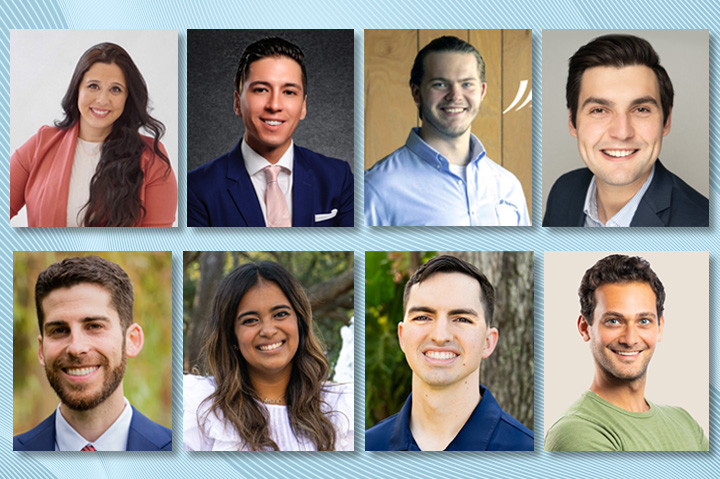
Then Cohen began to seriously consider a future with her family’s distributorship. She started an undergraduate marketing and entrepreneurship program, and quickly realized it was a natural fit for her. She even sold promo to local businesses during those two years, and didn’t wait long to join Team SCG – she finished classes on a Thursday and got to work the following Monday.
During the next 10 years, Cohen ascended in sales and then management, helping Team SCG enter its next phase – like reaching $22 million in revenue in 2022. She was on the C-suite path, and after a year of acting as “silent CEO,” the role became official last August. Her dad, formerly CEO, became the president.
“I’m proud of the family business,” she says. “There’s a legacy there that I wanted to be a part of. I wanted to liven it up, bring on younger talent, work with younger clients and come out of my dad’s shadow.”
Many have long lamented the graying of the promo industry and its supposed lack of appeal to younger generations. Likewise, there’s the adage of “shirtsleeves to shirtsleeves in three generations” – the belief that what’s built by the grandparents is often squandered by the grandkids.
The executives featured here – all 35 and under and leading successful family-owned businesses – are turning those assumptions on their head. All of them were exposed to the business early, were allowed to explore opportunities on the outside, and returned not because they were forced to, but because they wanted to. They didn’t accept jobs at their family’s firms for an easy living, but rather because they’re excited about the possibilities and want to help oversee the next phase. And they chose this path even though the expectations and pressure are, in fact, higher than on non-family staff because of the weight of holding up the company’s reputation that had been built by previous generations.
The transition for these young executives required encouragement, forethought, intentionality and trust. Here’s how several family-owned suppliers and distributors successfully brought on the next generation.
Encourage them to forge their own paths
These young executives say their families didn’t pressure them to join the firm, even if they had worked there part-time in years past. Instead, the families recognized that the next generation would only be happy if it was a good fit. They trusted that if their son or daughter (or grandson, granddaughter, nephew or niece) was meant to work there, they’d find their way back.
David Geiger, part of the fifth generation of management at Lewiston, ME-based Top 40 distributor Geiger (asi/202900), went to college in California. He pursued a few jobs there, including in marketing and real estate, but felt unsatisfied. So he came back to Maine, took a temporary compliance job at the distributor in 2011, and then went back to California for law school in 2015; his goal was to return as general counsel. He took the job at the end of 2018, at just 30 years old and immediately after passing the bar. He’s now vice president and general counsel of a company that brought in $327 million in 2022 and has already made two acquisitions this year.
“I wanted to be in the company,” he says. “I just didn’t expect it so quickly. And there was no pressure from my dad [company chairman Gene Geiger]. My grandfather made his children join the company – my dad was having the time of his life, and he was forced to come back. He didn’t want that for me.”
of promo executives are under 35.(ASI Research)
Matt Rubin, the 27-year-old director of strategy at Blue Generation (asi/40653) in Long Island City, NY, has long been interested in his family’s company. After graduating from Emory University in Atlanta, he decided to first gain experience outside the industry. After time spent at a B2B SaaS company in the commercial real estate sector, he and his dad, CEO Eric Rubin, decided it was time for Matt to join Blue Generation, a division of M. Rubin & Sons, started by great-grandfather Milton Rubin in 1944. Matt became official in May of this year.
“There was no pressure from my dad,” he says. “He wanted me to pursue what I was passionate about and what I believed in. When businesses force family members to join, the relationship and the company can crumble. This was an organic interest for me, based on my love for the company and the industry.”
As a high school student, Andrew Titus performed building maintenance at United Franchise Group (UFG) in Palm Beach, FL, his family’s company that’s the parent of Top 40 distributor Fully Promoted (asi/384000). Titus moved to Alabama in college and worked part-time at a local Fully Promoted franchise before hitting the road for Manhattan to pursue a career in theater. While there, he took a job as a Fully Promoted regional manager in the New York City area to earn money “for a few months” … and ended up falling in love with the company.
He left the lights of Broadway behind and moved back to Florida in early 2020 as a regional vice president for Fully Promoted. Two years later, he was named EVP of development; just a few months later, in late 2022 (the same year the distributor generated $123.7 million), Titus was named president of Fully Promoted and is now a member of Counselor’s Power 50 list along with his father, Ray.
“For my dad, the company was always just an option for us,” says Titus, whose two brothers and three cousins also work in different capacities at UFG. “He never forced it on us.”
“For my dad, the company was always just an option for us. He never forced it on us.” Andrew Titus, Fully Promoted (asi/384000)
At Warwick Publishing Company (asi/95280), a family situation in the spring of 2021 launched Alex Paschal, at the time just 25 years old, into the president role. Paschal, the fifth generation of family members to run the business, had planned to go into the oil & gas or paper manufacturing industries, but knew about halfway through college that he wanted to be part of the family business. He had in-depth knowledge of the company, having had a hand in everything from accounting to die-cutting to digital printing as a high school student.
He joined Warwick in general management in early 2020 – and immediately began helping to navigate the company (including many staff members who’ve known him since he was a newborn) through the tumultuous and unclear waters of COVID. That baptism by fire prepared him for assuming the role of president when his uncle, Jim – the current president – passed away in May of the following year, just before the company was named Counselor’s 2021 Supplier Family Business of the Year.
“It was pretty abrupt,” says Paschal. “I had gotten my MBA and I prepped for classes by reiterating the content to my dad, Rob, over and over. That gave him the confidence that I could do this. I realized that my family has always taken care of me, and now it’s time for me to take care of them.”
Jason Lipsett, the 34-year-old vice president of strategic initiatives at Charles River Apparel (asi/44620) in Sharon, MA, also had his family’s company in mind as a business management major in college. But first, he moved out to California to explore his options. However, the promo industry kept reeling him in – he even attended a fASIlitate event during that time. He talked to his dad, Barry (the company’s CEO and president), who had hoped he’d join officially but let Jason come back on his terms. About 10 years ago, Lipsett knew there was an opportunity for him to take Charles River into its next phase.
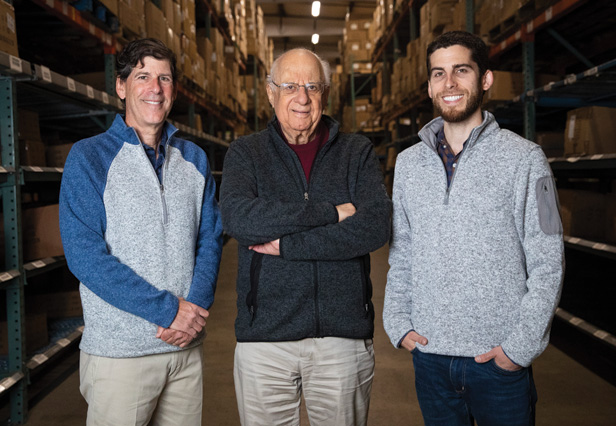
Three generations of leadership at Charles River Apparel: (Left to right) Barry, Walter and Jason Lipsett
“The company was at a growth tipping point,” Lipsett says. “I knew I could add value and there was a role that was a great fit for me. There was anticipation that I would one day become part of the company. It simply happened sooner in my career than I’d first imagined.”
Brian Roney, the 30-year-old son of Vera Muzzillo, CEO of Top 40 distributor Proforma (asi/300094), spent his college years and a bit longer pursuing a career in investment banking and wealth management. But the culture of high finance was tough – Roney asked for just one day off in a year and a half … and felt guilty about it. That was when his mother made him a proposition.
“She started talking to me about the tech they were working on at Proforma,” says Roney, who had worked at the company as a student, doing things like assembling lanyards and welcome bags for events. “I had thought I’d continue rising up in investment banking. I had taken some computer programming in school, but my mom said, ‘I think you can help us with these projects.’”
Roney started in October 2018 as a business analyst, and as of March 2023 is senior director of product design, with an approximately 30-person team. He focuses mainly on the company’s business management and e-commerce systems.
“I love my family and I love helping people and being around the business,” says Roney. “It’s not just pens and water bottles. We know about the risks our distributors have taken to open their own companies and the impact on their families. I could see the personal impact of what we do.”
Q&A: Best Practices for Welcoming the Next Generation
An expert in family-business dynamics and succession discusses the questions that need to be asked and the critical conversations that should take place before a family member joins a company full-time.
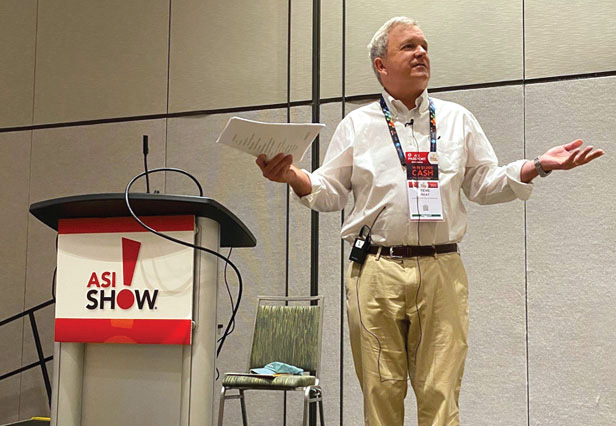
Dr. Steve Treat, Council for Relationships
Appointing the next generation of management requires forethought, intentionality and honesty. Dr. Steve Treat, CEO emeritus of Council for Relationships and a popular speaker at the ASI Shows, is an expert on family businesses and philanthropies, family unity and challenges of succession. Here, he offers straightforward advice on the questions to ask to determine if a family member is the right fit. – Elena Hubert
Q: What personal attributes should company executives look for in members of the next generation?
A: The most important thing is that they’re competent for the role. At a minimum, they should meet the requirements of what management would be looking for if they were hiring outside the family.
Q: Where do people usually go wrong with this?
A: The worst-case scenario is that they bring on family members who can’t find another job, so they haven’t built their own confidence, identity and sense of skill. Some companies can help with this through education, but it’s important that they have some work experience. The potential hire ought to be able to get a job easily at another company.
Q: What personality traits do you think help someone gel in a role?
A: They need to be able to take a piece of criticism and probe it, think about it and talk about it with their parent or boss. They need to have humility, and not use their last name as a point of power. They should be humble enough to recognize that there are probably many people in the company who could mentor them.
Q: What are some red flags that shouldn’t be ignored?
A: They take any criticism and feedback as negatives. They’ve reflected very little on their own strengths and weaknesses – they think they’re entitled to a job.
Q: What kind of buy-in needs to be had from the executive team to ensure a smooth transition?
A: Executives have to believe that the hire makes sense, and the family member coming in has to recognize that they’ll need to build trust with both their family members and non-family members.
Q: Do you think the onus is more on the individual coming in or the company?
A: I do think the onus is on the individual, but the company has to communicate to the rest of the team: “This is a family business, and we’re interested in having leadership passed down through the generations.”
Q: What resources are available to help family members navigate personal and unique dynamics?
A: Hire an outside consultant who can help ask the important questions, like: What’s the level of communication between the generations? What’s the level of expertise the next generation brings in? What kind of job are you looking for this person to do? Are you setting up for failure or success?
Her family has always been close-knit, but Anika Bhavnani, vice president of operations at Top 40 supplier Sunscope (asi/90075), says her relationship with her father, Dilip, has deepened even further since she joined full-time in 2021. She remembers as a child browsing the company showroom with her little brother, and selling phone chargers at school when she got older. “I got in trouble for it, but I thought it was fun,” she says. “My dad has always been entrepreneurial, and I like to think I am, too.”
Now in her mid-20s, Bhavnani had planned to go into PR and advertising. Despite multiple job offers in Miami, where she went to college, she moved home to California during COVID to work at her family’s company, established by her great-grandfather in Hong Kong in the 1940s.
While Bhavnani hadn’t expected to join the company immediately after college, the move felt right. “My dad said, ‘Come and give it a shot and see if you like it. If not, we’ll figure it out,’” she says. “I also didn’t expect to spend all my time with him, but we’re two peas in a pod and I wouldn’t have it any other way.”
While Cohen’s father supported her early foray into healthcare, he was also supportive of her change of heart and welcomed her into the business. “Dad has always let me carve my own path – he trusts me, and he tells me it’s O.K. to make mistakes,” she says. “Being a decision-maker comes with that pressure.”
Keep expectations high
What’s noteworthy among these young executives is their lack of a sense of entitlement, despite having the same last name as the company owners. They may have been brought on at a young age, but the last thing they want is for the industry, their clients and especially staff to credit nepotism with their career ascension. And they’ve set out to prove their capabilities and talent.
“Pressure is higher on family members, especially when you’re a Geiger,” says David Geiger. “You have to work hard, show up earlier than everyone else and stay later than everyone else. The previous generation embedded it in the next generation, who carried it forward. There can be a mindset that family members who join their family’s companies aren’t actually qualified. Here, you’re not getting any special favors.”
Titus says he too feels the weight, but also thrives on the fact that his father trusts him to make important decisions. “There’s definitely pressure – my job is not to screw this up,” he says. “But I wouldn’t want it any other way. It adds to my fuel and fire to want to make others successful.”
“Pressure is higher on family members, especially when you’re a Geiger. You have to work hard, show up earlier than everyone else and stay later than everyone else. You’re not getting any special favors.” David Geiger, Geiger (asi/202900)
There’s certainly pressure on Rubin to carry the family name as he helps lead Blue Generation’s next phase, but much of it is self-imposed. He comes to the office five days a week, as a firm believer that in-person collaboration with others is critical to innovation. “One of my favorite quotes is from tennis star Billie Jean King: ‘Pressure is a privilege,’” he says. “I put pressure on myself. I want to continue the company’s legacy and grow it. It’s my own ambition and how I’m wired that drives me.”
Bhavnani says that, while she does feel pressure to prove herself as a family member, it’s “fun” and “challenging.” She’s also not above turning to team members (including those who’ve known her for years) and asking for support.
“When I joined in 2021, I told the team I would need their help,” she says. “I’m close with the head of compliance; she’s known me since I was an infant and has helped me every step of the way. I have a great support team behind me. Everyone pushes me up and wins are shared. I’m figuring it all out alongside our people.”
High expectations aren’t just for the benefit of young family members; they’re critical for team morale. Staff members need to see that the new executive is there because of their willingness to learn and commitment to the company and the people, not just because of the family connection.
The Cohn Family Shares Their Secrets of Generational Success
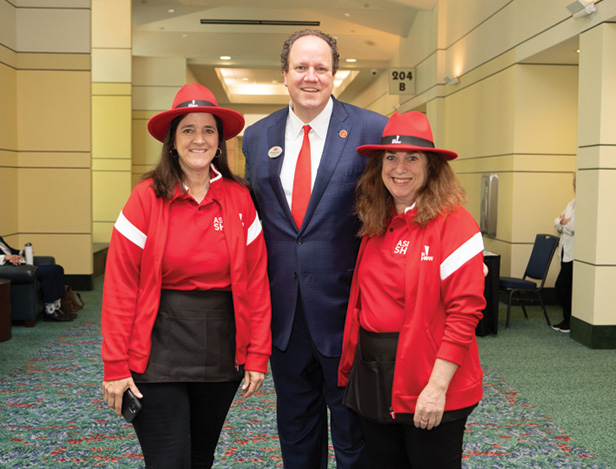
ASI Corporate Vice President Stephanie Cohn Schaeffer (left) and ASI Vice Chairman Matthew Cohn spoke about family business during a session at ASI Show Fort Worth. They were joined before the session by their sister, Debra, a lawyer who previously worked for ASI.
At this year’s ASI Show Fort Worth, ASI Chairman Norman Cohn and his children Matthew Cohn and Stephanie Cohn Schaeffer discussed the rewards and challenges of running a family business. “A family business means we care,” said Matthew, vice chairman at ASI. “We spend a lot of time thinking about how we can add value to help the industry prosper, help each of our customers do better and help overall success. We have many long-standing employees who feel like they’re part of our family.”
“When my role changed in 2023, it was a collective decision by the family and leadership team,” says Lipsett, who now oversees marketing, strategy, company culture, digital transformation, and hiring and retaining talent. “I wanted to be in position to focus beyond just one function. Family members wear a lot of hats, and it was important for me to stand in for my dad and help guide the strategic direction of our company.”
Cohen was genuinely interested in the future of the company, not just the title. “I never wanted to be just ‘the boss’ daughter’ – I wanted to work harder to prove I was more than that,” she says. “I need my team to believe in me, to trust that me sitting here is an asset for them, that it’s not nepotism, that me being here would propel us further.”
Trust them to execute
These family businesses also trust their young executives to take the company to the next level, which has led to significant growth and evolutions in corporate culture to keep pace with larger workplace trends.
Titus, for example, has overseen considerable expansion at Fully Promoted since late 2022. The company opened 33 new U.S. franchises in 2023 (tripling the amount it opened the year before) and increased year-over-year franchise sales about 5%. “Dad trusts us and gives advice, but ultimately it’s our decision,” he says. “That’s freeing. That’s how we learn.”
of American companies are family-owned.(U.S. Census Bureau)
Similarly, despite not expecting a career in tech, Roney has delivered for Proforma. Since joining full-time in 2018, the number of stores on the company’s e-commerce system has grown from about 2,000 to now approaching 11,000, and overall store revenue has doubled. But he’s quick to credit distributors with doing great business.
“I ask myself, ‘what would I like to see as a distributor?’” he says. “I work hard, and I ask a lot of questions to get a sense of the whole landscape. But at the end of the day, the distributors are the ones making the sales.”
After Bhavnani was given the opportunity to learn about and explore the industry in the early days of her career at Sunscope, she started focusing on company culture. She set out to make the environment more fun by hosting regular happy hours, maintaining the company traditions of Thanksgiving and Diwali celebrations, and holding weekly calls with the sales team to celebrate wins.
“I want people to be happy to come to work,” she says. “I want to add some spice to the business. I want people to have things to look forward to. We do check-ins to make sure everyone is happy and comfortable. We’re always asking, ‘What can we do better?’ I wear a lot of different hats.”
“We have a ton of momentum right now. We’re making promo fun again. My dad and uncle built the road and put a bike on it, and I just turned that bike into a Lamborghini.” Shayna Cohen, Team SCG (asi/315978)
Similarly, Cohen was also trusted to oversee personnel and culture. She started full-time at Team SCG in sales and did $1 million in two years. But she wanted to focus on operations, which led to her current CEO role.
“I was more interested in efficiencies, finding resources, bringing on and nurturing talent,” she says. “I wanted to work on, not in, the business. My dad and uncle thought I was crazy because I was doing so well in sales, but I moved into management and was vice president for about two years before becoming CEO.”
Now, the company is a different place from when her dad and uncle ran it solely, says Cohen. Team SCG has brought on younger talent, catered to younger buyers, livened the place up – and doing $22 million in 2022 wasn’t so bad either.
“We have a ton of momentum right now,” she says. “We’re making promo fun again. My dad and uncle built the road and put a bike on it, and I just turned that bike into a Lamborghini.”
Eyes Forward
These executives aren’t resting on their laurels – they’re actively bringing their families’ companies into the next phase of the business and shaping the workplace for existing and new team members. Here they share their next priorities and goals.

“I want to become more familiar with AI’s impact on promo. We need to have a brainstorm day where we talk about it. I don’t want it to be scary anymore – let’s embrace it and get ahead of it. We can use it to be more productive.” – Anika Bhavnani, Sunscope
“I’m excited about stabilizing – 2024 is an investment year. We’re working on building a better foundation for our growth. I’m excited to see our people see the fruit of their labors, for us to unlock all the potential we’ve been building.” – Shayna Cohen, Team SCG
“We’re working toward a platinum rating from EcoVadis in the U.S., and I want to be more at the front-end of M&A transactions, like meeting with sellers and negotiating deals. I want to see more of the sales and operations side.” – David Geiger, Geiger
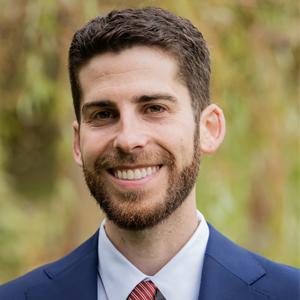
“We want to be authentic and relatable no matter how big we are, and we want to help customers achieve mutual goals.” – Jason Lipsett, Charles River Apparel
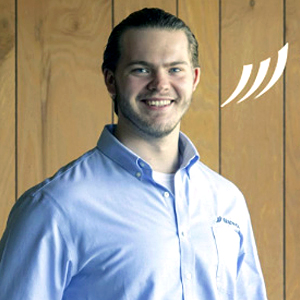
“I don’t want us to fall prey to corporate automation – we want customers to talk to a person when they call.” – Alex Paschal, Warwick Publishing Company
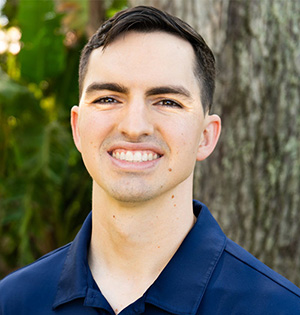
“We want to decrease the friction in the whole process. Little things will add up to a better experience for distributors. We want to empower their success.” – Brian Roney, Proforma

“We’re going to enter into strategic partnerships that will expand our offerings more than ever before. We want to be ahead of market demand with exciting new products, and we’re going to make processes more efficient both internally and externally.” – Matt Rubin, Blue Generation
“By the end of 2024, I’d like to have opened 40 locations and increased sales 5% to 10%. In five years, I want to be operating 500 locations and be doing more than $250 million in sales among our franchisees.” – Andrew Titus, Fully Promoted
